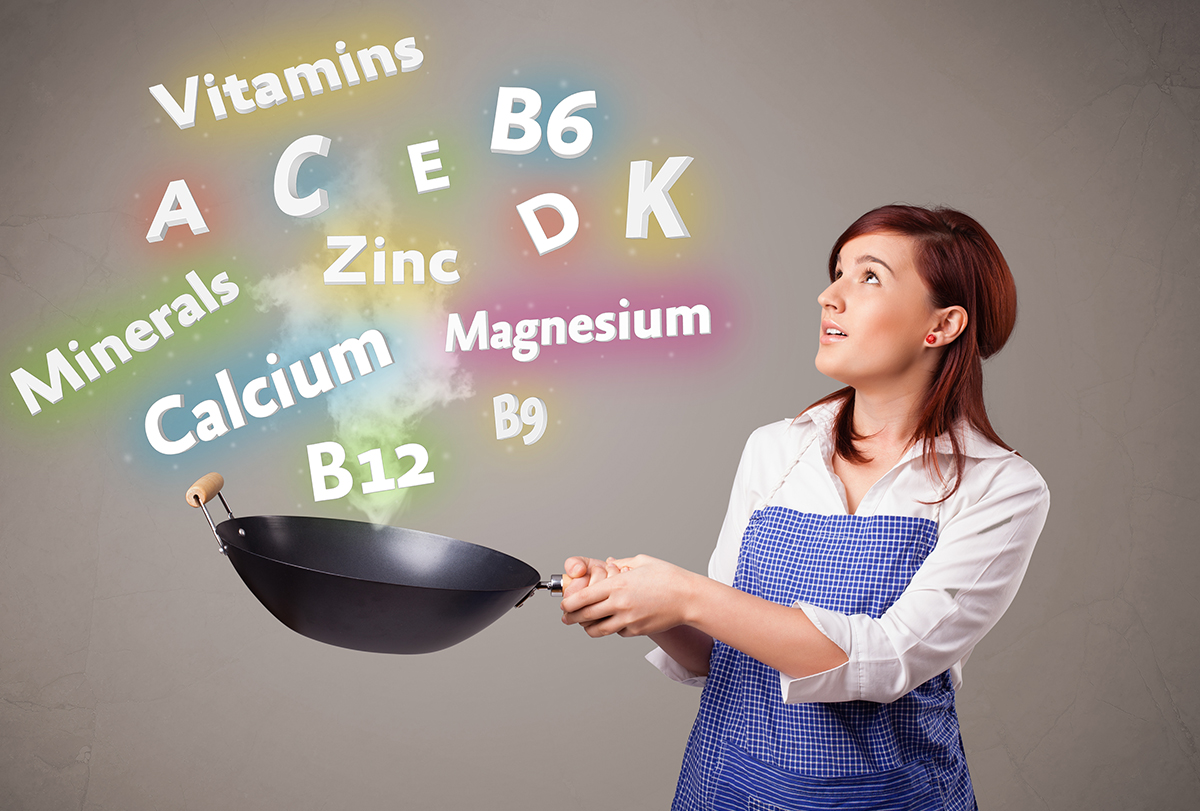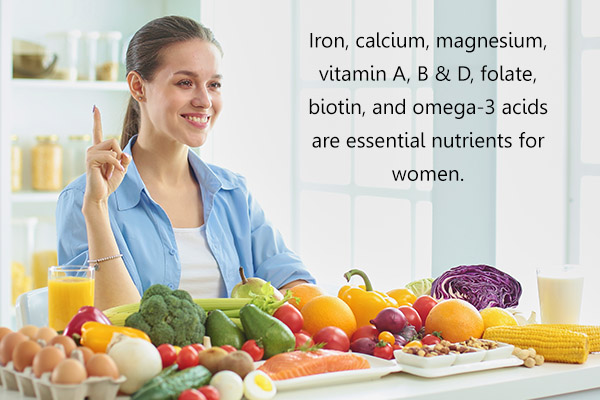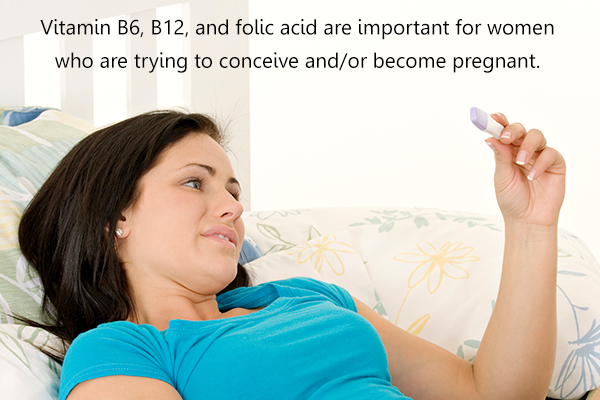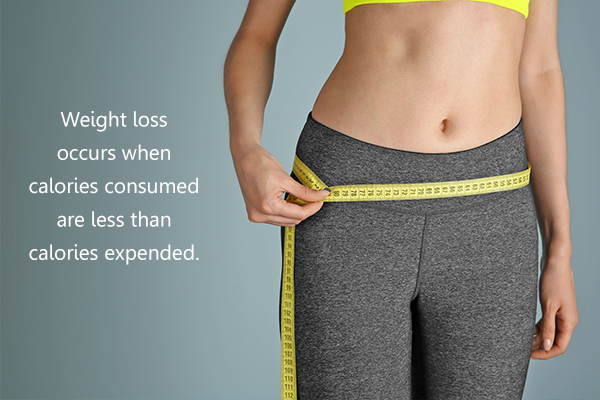In this article:
Nutritional needs tend to change in accordance with advancing age and overall health. However, there are certain vitamins that are required by everyone in different amounts to sustain important body functions.

The female body has to undergo drastic physical and biological changes during the process of reproductive maturity, pregnancy, and menopause, which is why women generally require more of certain vitamins than men.
Vitamins also play a key role in skin aging, prevention of diseases, and general health. Therefore, women need to adjust their diet according to their evolving nutritional needs.
Essential Vitamins for Women

Women require certain vitamins more than others. Here’s a list of such must-have vitamins along with their best food sources:
1. Vitamin A
Vitamin A can be supplied by leafy greens as well as orange and yellow-colored vegetables such as sweet potatoes and carrots. Other sources include tomatoes, fruits, dairy products, liver, fish, and fortified cereals.
2. Folate
Folate in pure natural form can be derived from green leafy vegetables, avocados, beans, eggs, and peanuts. Synthetic folate, or folic acid, is used to fortify cereals, pasta, bread, and rice or is available as supplements.
3. Biotin
Biotin needs can be met through a variety of foods such as cauliflower, sweet potatoes, avocados, raspberries, liver meat, almonds, seeds, eggs, milk, and grains.
4. B vitamins
These vitamins can be procured from fish, poultry, meat, eggs, dairy products, green leafy vegetables, legumes, many kinds of cereal, and some breads.
5. Vitamin C
Vitamin C is available in ample amounts in all fruits and vegetables, particularly citrus fruits, red pepper, and broccoli.
6. Vitamin D
Vitamin D is mainly found in fatty fish, such as salmon and tuna, and fish liver oils. Small amounts are found in beef liver, cheese, and egg yolks. Many people also meet some of their vitamin D needs through exposure to sunlight.
While consuming these foods helps supply vitamins to the body, it is only useful if the body can absorb and utilize the vitamins. Therefore, it is essential to include micronutrients that aid vitamin metabolism in your diet. These include:
- Iron: Iron is abundantly present in dark green leafy vegetables, whole grains, cereals, beans, lean red meat, fish, chicken, and turkey. Consuming these foods with those rich in vitamin C can lead to better absorption of iron in the body.
- Calcium: Calcium is found in dairy products such as milk, cheese, and yogurt, as well as dark green leafy vegetables such as kale and broccoli.
- Magnesium: Magnesium can be obtained from green vegetables such as okra, certain varieties of beans, unrefined whole grains, nuts, and seeds.
- Omega-3 fatty acids: These beneficial fatty acids are richly available in fish, particularly fatty fish such as salmon, tuna, sardines, and mackerel. They can also be derived from plants and nut oils.
The Best Anti-Aging Vitamins for Women
Certain vitamins possess anti-aging properties and are generally known as antioxidants. These include vitamin A (retinol, beta-carotene, and carotenoids), vitamin C, and vitamin E.
Antioxidants may slow down the aging process and also lower the risk of some health conditions. (1) They appear to play a role in protecting you from free radicals, which are tiny particles your body makes that can tear cells apart.
Vitamins for Pregnancy

Vitamin B6, vitamin B12, and folic acid are important for women who are trying to conceive and/or become pregnant.
1. Vitamins B6 and B12
These are involved in several critical body functions, and their deficiency during pregnancy can hamper fetal development, often leading to birth defects in the newborn. Moreover, the need for both vitamins B6 and B12 increases slightly as you move from the childbearing to the breastfeeding stage.
According to the National Institutes of Health (NIH), pregnant women are advised to take at least 1.9 mg of vitamin B6 per day, which increases to 2 mg when they start breastfeeding their newborn. (2)
Similarly, the recommended daily dose of vitamin B12 is 2.6 mcg for pregnant women and 2.8 mcg for those who are lactating. (3)
ALSO READ: Why Do You Need Vitamin B12, According to a Physician
2. Folate
Folate is a B vitamin that produces and maintains new cells, including red blood cells, and it is necessary for proper brain function. (4)
This vitamin is essential for all women, but especially for those who are pregnant as it helps in the development of the fetus. The daily recommended intake of folate/folic acid for women of reproductive age is 400 mcg, which increases to 600 mcg during pregnancy.
Once the child is born, the folic acid dose is tapered to 500 mcg per day. (5) Childbearing women who do not get enough folic acid are more likely to give birth to babies with spinal cord problems, such as spina bifida.
Vitamins That Help Adolescent Development
A rich supply of vitamins becomes more so essential during the growth years, that is, the teenage years. Calcium and vitamin D are essential for bone health. You want to build bone density in your teens and twenties because the body will lose some as you age.
In your twenties, you need at least 1,000 mg of calcium daily and 600 IU of vitamin D daily. (6) Iron is also important for those with heavy periods as blood loss during this time depletes the body’s iron stores. (7)
Vitamin Supplements

Eating a varied, well-balanced diet is the best way to fulfill your nutritional needs, but some people may have to resort to alternative sources.
There are various vitamin supplements available that can be taken upon consulting your doctor in case of a deficiency or if you are unable to meet your daily requirements through the diet.
If you follow a specific eating pattern or diet that omits specific foods or food groups, you may need to supplement certain vitamins. For example, vegetarians need to supplement vitamin B12, whereas vegans need to supplement vitamins B12 and A.
The most common form of vitamin supplements is a multivitamin (MVI). However, if one consumes a varied diet, an MVI is likely not needed. Nevertheless, a daily MVI is likely not harmful. The water-soluble vitamins (B and C) are excreted via urine if not needed in the body.
Despite the popularity and extensive use of multivitamins in recent times, studies have shown that they do not necessarily reduce the risk of certain chronic illnesses. (8) Moreover, many multivitamin supplements are largely unregulated.
Do Vitamins Aid in Weight Loss?

No. Weight loss is best achieved when consuming a well-balanced diet and maintaining an active lifestyle. Weight loss occurs when calories consumed are less than calories expended.
Final Word
The nutritional needs of women change with their age and the roles they play. While a pregnant woman may require some vitamins in larger quantities, a teenage, breastfeeding, or menopausal woman requires other vitamins.
Therefore, it is vital to be aware of your vitamin needs, which can be fulfilled through a healthy diet. In some cases, you may require vitamin supplements, but these should only be taken upon consulting a doctor.
- Was this article helpful?
- YES, THANKS!NOT REALLY


